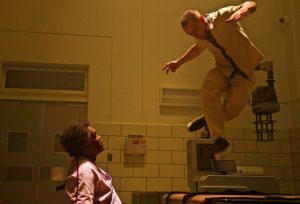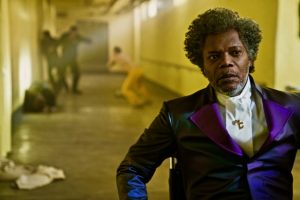By Dwight Brown
NNPA News Wire Film Critic
After viewing Glass, there will be a great debate: Should M. Night Shyamalan stop writing scripts for his films? Should he refrain from directing them? Or maybe both!
Remember The Sixth Sense? Slow, odd movie with a very shocking ending? Shyamalan has gone back to that drawing board and sketched in a hybrid movie that pulls together plotlines from two of his previous films. Unbreakablefrom the year 2000: David Dunn (Bruce Willis), a security guard, is involved in a catastrophic train accident that kills all onboard, except him. A stranger, Elijah Prince (Samuel L. Jackson), aka Mr. Glass, swears the event was Dunn’s destiny. Splitin 2016: Kevin Wendell Crumb (James McAvoy), an evil man with super strength and 23 personalities, kidnaps three girls. The most venomous of his inner demons, The Beast, is vile beyond redemption.

James McAvoy as The Beast, one of the 23 personalities that reside inside Kevin Wendell Crumb in “Glass,” written and directed by M. Night Shyamalan.
Fast forward to 2019, Philadelphia, PA., Dunn is a street vigilante with inordinate power and becomes clairvoyant when he brushes up against people. He wears a hooded raincoat to hide his identity as he stalks and annihilates criminals who prey on innocent victims. Cops hunt him. His son Joseph (Spencer Treat Clark) supports his efforts.
Prince, a supervillain mastermind with a genetic disorder that leaves his bones so brittle they break like potato chips, is a patient/captive at the Raven Hill Memorial Psychiatric Research Hospital. Crumb? Well he has kidnapped four high school cheerleaders and is toying with them as he summons up the devil inside for a massive slaughter. After some fights, brawls and power struggles, all three wind up at Raven Hill, under the supervision of Dr. Ellie Staple (Sarah Paulson), a psychiatrist who specializes in delusional behavior particularly with people who believe they have super powers.

(from left) Samuel L. Jackson as Elijah Price/Mr. Glass and James McAvoy as Kevin Wendell Crumb/The Horde in “Glass,” written and directed by M. Night Shyamalan.
Shyamalan combines the two previous storylines but never ups the ante. The theme in this new venture explores people who have extraordinary abilities and use them for good or evil, a subject that is only mildly intriguing. Instead of making this premise a source of inspiration, his very clunky, heavy-handed script belabors the point. At some juncture, audiences won’t welcome that silly unfulfilling thought patter. Dunn says: “You can’t explain everything away.”
Then there’s the very illogical plot pieces and improbable events that lead to a surprising but limp conclusion. It’s dumb for Dr. Staple to put the three very combustible oddballs in the same facility. Dumber still to allow her staff easy access to their highly secured cells/rooms. Employees hand deliver meals to the devious patients, fraternize and make small talk. They don’t sense impending danger. Also, if the three volatile men are in a true high-security facility, escaping would not be a cakewalk and pushing a panic alarm button would be the first line of defense not the last one.

(from left) Anya Taylor-Joy as Casey Cooke and Charlayne Woodard as Mrs. Price in “Glass,” written and directed by M. Night Shyamalan.
The overwritten script plods along at a snail’s pace. The first one hour and fifteen minutes is tedious enough to cause a group eye roll. Sloppy indecisive editing (Luke Ciarrocchi and Blu Murray) stymies any rhythm. Shyamalan’s spotty unimaginative direction and Mike Gioulakis’ dull cinematography make fight scenes a snore. None of the action is filmed from an interesting angle and the camera’s placement is often quite awkward. Scenes build to a finale where the audience expects a cataclysmic, visually arresting orgy of a battle. But there is none. Compare the style, direction, cinematography and special effects of The Avengersseries, Wonder Woman, TheDark Knight, DeadpoolandBlack Pantherto that in Glass, and the latter’s execution looks even more pitiful.

Samuel L. Jackson as Elijah Price/Mr. Glass and James McAvoy (background, in yellow) as Kevin Wendell Crumb/The Horde in “Glass,” written and directed by M. Night Shyamalan.
The three freaks are not all that engaging. Dunn is on the side of good, but with that constant scowl on Bruce Willis’ face, he is a buzzkill. Samuel L. Jackson acts like Samuel L. Jackson: He’s never met a piece of scenery he couldn’t chew up. The most curious performance is that of James McAvoy as the bizarre dude with freaky personalities. McAvoy shifts through them as smoothly as a Porsche gearbox going from park to neutral to drive, to turbo. Each character is distinct: the child, the woman, the hipster and the demon god from hell. McAvoy tries hard, but the direction doesn’t compliment his performance and his scenes drag on too long.
Paulson walks around comatose and is asked to say dumb things and disregard the way a real shrink would deal with patients. Even though what she is doing is a complete ruse, her Dr. Staples doesn’t act accordingly. Anya Taylor-Joy as a former Crumb victim and Charlayne Woodard as Price’s mom fill out the supporting cast without much conviction.
Two hours and nine minutes roll by, and the film is about as frustrating as standing in a TSA line at the airport. Fault the strained writing. Blame the lifeless direction. Question the injudicious editing. Abhor the clumsy cinematography. Condemn that lack of “wow” power special effects and dazzling action scenes.
Glass might cause a stir at Comic Con. Other audiences will likely scratch their heads in unison and hope they don’t get trampled as viewers stampede towards the exits.



